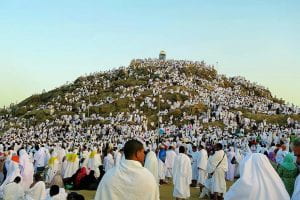 “Go, therefore, Mademoiselle, go in the name of Our Lord. I pray that His Divine Goodness may accompany you, be your consolation along the way, your shade against the heat of the sun, your shelter in rain and cold, your soft bed in your weariness, your strength in your toil, and, finally, that He may bring you back in perfect health and filled with good works.”1
“Go, therefore, Mademoiselle, go in the name of Our Lord. I pray that His Divine Goodness may accompany you, be your consolation along the way, your shade against the heat of the sun, your shelter in rain and cold, your soft bed in your weariness, your strength in your toil, and, finally, that He may bring you back in perfect health and filled with good works.”1
Over the past week, Muslims around the world observed Eid al Adha. This greatest holiday on the Muslim calendar comes at the end of the season of the Hajj Pilgrimage to Mecca, and it commemorates the sacrifices made by Prophet Abraham and his family (peace be upon them) for the sake of the One God. Of course, this year both the Hajj and Eid celebrations were nothing like they usually are. Hajj, usually attended by millions from around the world, was limited to a symbolic select few already present in Saudi Arabia. The normal mass prayers and other celebrations held by Muslims throughout the Chicagoland area could not be held. This continues to be a time of hardship and trial, and we know that many people in our own country and throughout the world are enduring great hardships.
When it became clear that Hajj could not take place as usual, one question that arose was what does this mean for Muslims as it is so important to our practice of the faith? Indeed, it is well known as one of the “pillars” of Islam. Not being able to observe Hajj and commemorate the sacrifices of Abraham and Hagar and Ishmael is a great sadness. However, it caused me to reflect that the vast majority of Muslims, today and throughout history, have not been able to make Hajj. Global travel is a privilege limited to a select few. I have never been to Mecca and intended to go this year for the first time myself. Yet, Hajj is part of the spiritual imagination of every Muslim. We tell stories about it, we learn about it, we donate funds to help others go, we honor those who have attended and celebrate their return, we ask them what they learned, and we dream about it. We seek to learn lessons from it, whether we can physically go or not. Much as we also seek to learn lessons which come from shared sacrifice and assisting the vulnerable, those lessons found in our own day to day experiences and challenges, as well as those found in the people around us.
Vincent de Paul spent a great deal of his life organizing and sending missionaries on journeys intended to be in the service of God and the poor. In his brief essay, “Vincent the Traveler,” Jack Melito, C.M., observes that Vincent’s zeal drove him to want to go wherever was necessary to advance his mission. Yet, while he did often travel in his early life, Vincent spent his later years mainly confined to Paris. However, while “his body stayed at home…his zeal roamed.”2 Vincent vicariously traveled these missions through those he sent on them, and through the letters and communications shared with them.
Whatever our circumstances, in what ways can we view the hardships and challenges we face at this time as opportunities to learn and transform? In what ways can we try to balance our willingness to make sacrifices with our hope to return “in perfect health and filled with good works”? How might we better see this difficult time as one challenging part of life’s long journey or pilgrimage?
1) Letter 39, To Saint Louise, 6 May 1629, CCD, 1:64-65.
2) Jack Melito, C.M., Saint Vincent de Paul: Windows on His Vision (Chicago: Vincentian Studies Institute, 1999), 17. Free to download: https://via.library.depaul.edu/vincentian_ebooks/8/
Reflection by:
Abdul-Malik Ryan, Assistant Director Religious Diversity & Pastoral Care, Muslim Chaplain, Mission & Ministry
Abdul-Malik,
I really appreciate the way your piece connects Vincentianism with Islam through the lens of your own experience and thoughtful reflection, and is so contemporary as well – and I guess universal.
While in no way can I fully understand the importance of Hajj to countless Muslims around the globe, I feel the pain of those who cannot broadly gather together to prayerfully celebrate Eid al Adha as well as your own disappointment being unable to make your pilgrimage to Mecca. And this current, non-Christian religious experience has given me new insights and information about Vincent de Paul in his later years as well as challenged me to reflect on what this difficult time has to teach me spiritually and practically.
So many things in a brief piece! Thanks again for sharing it.